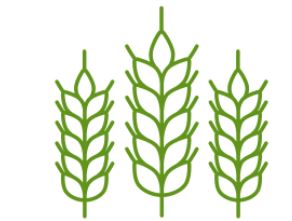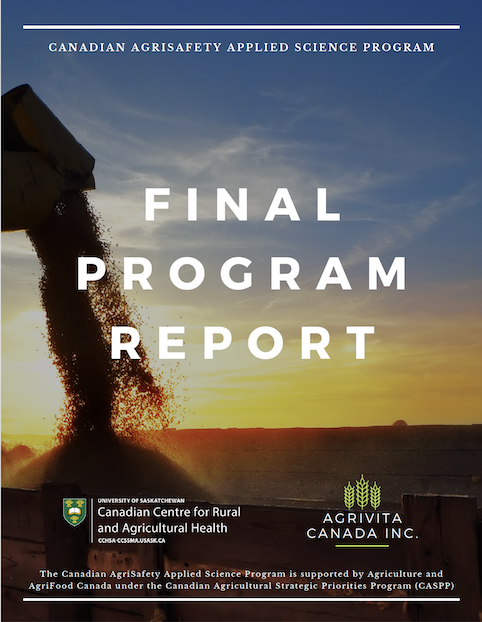Project Overview
Knowledge transfer is an essential piece of the research puzzle that brings together knowledge, innovation, and products from applied research. Agriculture presents a unique challenge for knowledge transfer (KT) efforts with such a great diversity of industry organizations, producers, and policymakers. To move agricultural safety practices and applications forward it is essential for the transfer of this knowledge from research into practise in order to develop new processes and ways of thinking. There is an existing gap in research-to-practice knowledge transmission that knowledge transfer efforts will aid in bridging in Canadian agricultural health and safety.
The Canadian Institutes of Health Research (CIHR) defines knowledge translation as “…a dynamic and iterative process that includes synthesis, dissemination, exchange and ethically-sound application of knowledge to improve the health of Canadians, provide more effective health services and products and strengthen the health care system.” In the context of agricultural health and safety, this includes the synthesis, dissemination, and exchange of new knowledge and applied outcomes to improve the health and safety of Canadian farmers, and to help protect them from injury, illness, and disability. At the end of the day, the ultimate factor in determining the success of research is to have it put to meaningful use in real-world settings.
The Canadian Centre for Rural and Agricultural Health (CCRAH) has a 35-year history of conducting knowledge translation activities throughout Saskatchewan (and, in the past, across Canada) through the Agricultural Health and Safety Network. The Network produces and delivers occupational health programs and materials to almost 30,000 farm families across Saskatchewan, representing more than half of all Saskatchewan farm families and approximately 70% of all Saskatchewan rural municipalities. CCRAH will utilize its expertise in agricultural health and safety to develop and disseminate KT materials, information, and resources to stakeholders across Canada regarding the funded projects under the Canadian AgriSafety Applied Science Program.
The overarching goal of this component of the Canadian AgriSafety Applied Science Program is to provide KT materials and programming to ensure that practical, usable products, processes, and knowledge are developed and made available to end-users in the most effective manner possible. The KT team will work with researchers for each project with the objective of developing appropriate programming that interfaces with the six elements of the Hierarchy of Control (hazard identification, risk assessment, hazard elimination, engineering controls, administrative controls, and personal protective equipment). Safety knowledge gained from these applied research projects will be available across Canada through collaboration and distribution efforts through the Canadian Agricultural Safety Association (CASA). One of the primary methods of dissemination and communication will be through a national KT news alert publication CANFARMSAFE. All documentation produced by KT activities will be produced in the two official languages of Canada: English and French.
Year 1
2019 - 2020 Year 1 Update
Knowledge transfer (KT) is an essential piece of the research puzzle that brings together knowledge, innovation and the products from applied research and provides a method to increase awareness and uptake of the output and findings of the six applied research projects. The aim of the program-wide knowledge transfer activity is to develop, produce and disseminate knowledge transfer materials pertaining to the six activities of the Canadian AgriSafety Applied Science Program. Given the applied nature of the AgriSafety Program projects, KT plays a role in moving research into practical applications and use by end-users and stakeholders in agriculture.
Knowledge transfer (KT) activities in Year 1 focused on establishing relationships with each project team to ensure ongoing communication regarding the projects to provide information for KT output materials. One bulletin was produced for each project, for a total of six bulletins in Year 1. The final copies of the bulletins were provided to the team leads and are available on the Agrivita website - www. agrivita.ca. Project team leads were encouraged to share the bulletins with other organizations and project partners. The final bulletins were shared on CCHSA’s Agricultural Health and Safety Network social media channels (Twitter and Facebook).
The KT team also made plans to produce a preview video for each of the projects to help increase awareness of the projects. Each project will have a short video to introduce their project and address why the purpose and goals and need for the project. The videos will be used to promote the projects online, and at trades shows and conferences. In Year 1, the video scripts for each project were developed.
 |
Year 2
2020 - 2021 Year 2 Update
Knowledge Transfer (KT) activities in Year 2 included:
- Hosting a virtual Annual Team Meeting in the summer of 2020 in place of an in-person meeting due to COVID-19 restrictions
- Development and publication of 12 CANFARMSAFE bulletins (2 per Activity)
- Development and publication of the Year 1 Annual AgriSafety Program Report
- Completion and distribution of the introductory project videos (1 per project at around 1 minute in length each)
The Annual Team Meeting, provided the project teams with the opportunity to come together (virtually) to present on the current state of their projects and discuss successes and challenges with the group. Each project lead gave a short presentation followed by a Q & A session. Subsequent meetings were also held over the summer months between the Knowledge Transfer team and each project. The purpose of these one-on-one meetings was to work directly with each of the projects to develop plans to meet the project-specific knowledge transfer needs and to help provide guidance relating to knowledge transfer and potential outputs.
In total for Year 2, twelve CANFARMSAFE bulletins were produced. The bulletins focused on current project progress/results, and also exploring and outlining the technical methodologies being used or developed. The final copies of the bulletins were provided to the team leads and are available on the Agrivita website (www.agrivita.ca). Project team leads were encouraged to share the bulletins with other organizations and project partners. The final bulletins were shared on CCRAH’s Agricultural Health and Safety Network social media channels (Twitter & Facebook), as well as through the Canadian Agricultural Safety Association (CASA) e-Communique electronic newsletter.
Building on the bulletins and as proposed in Year 1, an electronic newsletter was developed for the AgriSafety Program. The e-newsletter serves as a new avenue for the distribution of the bulletins, videos, and any other information related to the AgriSafety Program Projects. Two editions of the AgriSafety e-newsletter were produced in Year 2, the first edition provided a quick overview of each project and included the links for the project videos, while the second edition included short teasers from each of the informational bulletins produced over the summer of Year 2.
As part of the KT outputs an Annual AgriSafety Program Report was proposed and completed early in Year 2. It was originally proposed that the Annual Report be completed during each year of the program; however, given the nature of the report as it relies on information from the annual progress reports from each of the projects this timeline was not feasible. Instead, the KT team shifted toward having the Annual AgriSafety Program Report completed in the first quarter of the subsequent year to allow time for integrating the content from the team’s annual progress reports. The Year 1 Annual AgriSafety Program Report was made available early in the summer of 2020 both in print and online. The report is 20 pages long and features an introduction to the Canadian AgriSafety Applied Science Program, Agrivita Canada Inc., and each of the six projects. Since the report only covered Year 1 which began in fall 2020 the content of the report provided more information on the background, rationale, and outputs of each project since there were few results at the time.
 |
Year 3
2021 - 2022 Year 3 Update
Knowledge Transfer (KT) activities in Year 3 were directed toward the continued development, production, and publication of bulletins along with the AgriSafety Annual Program Report. Despite the ongoing COVID-19 pandemic, the KT team able to successfully complete the required objectives for Year 3.
The Annual Team Meeting was held October 14, 2021 where each project team provided a summary, update, and any preliminary results of the project to date. The Annual Team Meetings were developed as in-person events; however, with the ongoing restrictions due to the COVID-19 pandemic the Year 3 meeting was held virtually. The meeting also included updates from program management and the knowledge transfer team. Despite the virtual format, the Annual Team Meeting was a success and provided an excellent platform for the teams to discuss and collaborate on challenges and current project findings.
The Year 2 AgriSafety Annual Program Report was developed and disseminated to project partners early in Year 3. The report highlights the activities and findings of the year for each project and includes a summary of the AgriSafety Program. The third issue of the AgriSafety Newsletter was produced at the end of Year 3 and is available through the Agrivita website. Going into Year 4 we will continue to work to expand the reach and mailing list of this publication as it is to reach a broader audience.
Throughout Year 3 a total of 13 bulletins were produced, two bulletins per project, with three bulletins produced for Activity 4. One bulletin per project focused on preliminary project results and the second focused on the technical aspects of the project methodologies. The bulletins are currently in the process of being translated into French and will also be available on the Agrivita website.
 |
Year 4
2022 - 2023 Year 4 Update
Throughout Year 4 a total of 12 bulletins were produced, two bulletins were produced for Activities 1, 2, 4, and 6, 3 bulletins were produced for Activity 3 and one bulletin was produced for Activity 5. The bulletins focused primarily on preliminary project results.Year 5
2023 - 2024 Year 5 Update
Throughout Year 5 a total of 15 bulletins were produced, with three bulletins produced for Activities 2 and 5, two bulletins produced for Activities 3 and 4, and five bulletins produced for Activity 1.The bulletins focused primarily on final project results.
A project video was also produced for each of the activities.

